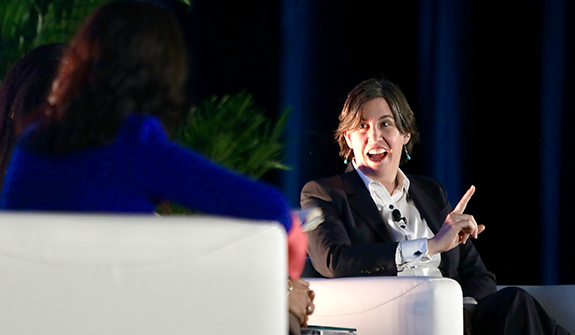Takeaways from the Responsible AI Forum
It shouldn’t take the next best idea or a major mistake for us to shape the future we want, especially when it comes to artificial intelligence. AI doesn’t evolve in isolation; it’s shaped by the choices, biases, and intentions of the people who build it. That’s why responsibility must be embedded in AI development from the start—not as an afterthought, but as a guiding principle.
Our recent AnitaB.org Tech Collaborative: The Responsible AI Forum brought together leaders across industries to address one pressing question: How do we ensure AI serves humanity, rather than the other way around? From ethical governance and AI literacy to cross-sector collaboration, the forum sparked powerful conversations about what it takes to build AI that is fair, transparent, and aligned with human values.
Candid Conversations on Responsible AI
So, what was learned and what are the takeaways?
A Duty of Care: Building AI with Intention
AI must be proactive, not reactive. It’s not just about if we can build it, it’s about if we should. Who benefits? Who might be harmed? These questions have to guide AI development from the start. As Attendee Neha Arnold put it, “Responsible AI starts with a duty of care. We can’t afford to be reactive. We must build with intention, asking not just can we build this, but should we? For whom? And what are the consequences?”
Without this mindset, AI risks amplifying biases and deepening inequalities. The Forum reinforced that responsible AI is about designing ethical systems from day one, instead of fixing problems later.
Collaboration is Key: No One Can Tackle AI Alone
AI affects everything from healthcare to climate policy. No single entity can address its challenges alone: cross-sector collaboration is essential.
In a discussion on AI governance, Erica Simmons and Cynthia Bailey highlighted how industry, academia, and policymakers must work together to create ethical, transparent AI systems. Innovation happens when diverse perspectives unite to build solutions that serve all communities.
AI Literacy: A Public Responsibility
AI shapes our daily lives, yet many lack the knowledge to question or engage with it. The forum emphasized that AI literacy should be a public right, not a privilege. The “Building Trust Through Data” session with Bjorn Johanssen and Lina Mikolajczyk explored strategies to make AI more accessible, including:
- Transparent AI systems so users understand how decisions are made.
- Educational initiatives for non-technical professionals.
- Public awareness campaigns on AI’s impact.
When more people understand AI, they can help shape its future.
Ethics as an Innovation Driver
Ethics isn’t a barrier to progress—it’s a catalyst for meaningful, lasting innovation. Rohit Bhargava underscored how companies leading in AI ethics are driving trust, adoption, and long-term value.
It’s important we understand that responsible AI is less about compliance, and more about building technology that benefits everyone. Doing the right thing isn’t a trade-off, it’s the key to sustainable AI innovation.
How We Move Forward as Women in STEM
The Responsible AI Forum made one thing clear: the future of AI relies on the people guiding it. Women in STEM fields play a critical role in shaping ethical AI, ensuring diverse perspectives influence the way AI is built, deployed, and regulated. Yet, systemic barriers persist. To drive real change, we must amplify women’s voices in AI leadership, research, and policy.
Looking ahead, key challenges remain:
- Bias mitigation: Ensuring AI systems are trained on diverse, representative data.
- Regulation & governance: Defining ethical standards without stifling innovation.
- AI’s impact on the workforce: Navigating automation’s effect on jobs and equity.
Why You Should Be Part of the Conversation
AI is moving fast, but its future isn’t set in stone. The most impactful innovations happen when diverse voices are in the room, asking the hard questions and driving ethical change. That includes you. Whether you’re a technologist, leader, or advocate, your voice matters in shaping AI that is transparent, inclusive, and accountable. Keep learning, engage in critical discussions, and advocate for responsible AI in your workplace and beyond.
We look forward to publishing a whitepaper enveloping all of the insights, findings, and crucial takeaways from our recent Responsible AI Forum in Chicago. Sign up for our newsletter to get first access, and for updates on upcoming discussions, events, and ways to get involved. The future of tech depends on all of us—let’s build it together.
Read more posts from the thread Keep an Eye Out for These Not-so Obvious Signs of Burnout

